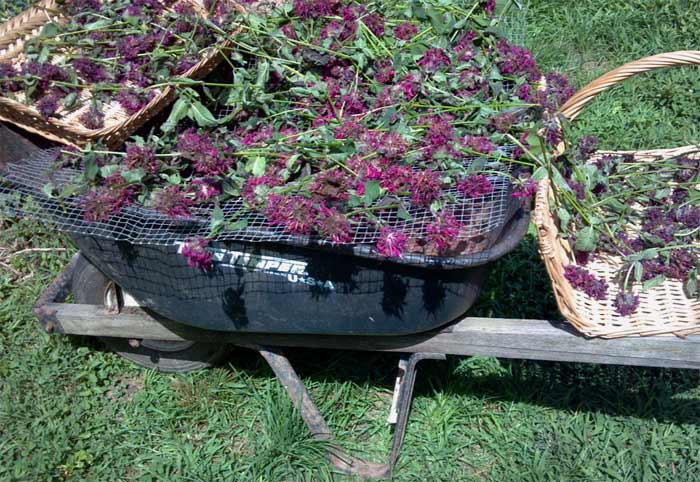Herbal properties and terminology
The properties of herbs
In herbal medicine, some plants are analgesic, some are antibacterial, or anti-tussin or carminative, or decongestants, or diuretics. There are emetics, emollients, and hemostatics.
Don't forget immunostimulants, insecticides, narcotics, nervines, sedatives, and stimulants! Learn more at Every Green Herb!

Adaptogens help the body’s immune system and adapt to the body's needs.They stimulate when needed or relax if that is more appropriate. Adaptogens include astragalus, echinacea, garlic, ginkgo biloba, ginseng, and yellowroot.
An analgesic like aspirin or willow bark relieves pain.
An antacid like mint and slippery elm balances stomach acids and helps stop heartburn.
Antibacterial herbs like cloves and eucalyptus fight and destroy bacteria.
An anti-coagulant like chamomile hinders blood clotting and increases blood flow in the arteries.
An anti-spasmodic like peppermint reduces muscle spasms and tension.
An anti-tussin like wild cherry reduces the coughing reflex.
Carminatives like catnip and fennel seed reduce flatulence and stomach discomfort.
Cathartics like rhubarb act as strong laxatives.
A cholagogue like yellowroot stimulates bile flow from the gallbladder.
Decongestants like eucalyptus and basil can relieve the upper respiratory tract.
Demulcents form protective barriers over mucus membranes. Honey and syrup are demulcents that coat the throat. Herbs like corn silk and comfrey are demulcents that coat and soften internal membranes.
Diaphoretics like elder flowers help cleanse the body of toxins by causing an increase rate of perspiration (sweating).
Discutients are herbs like black walnut and garlic that help to dissolve tumors.
Diuretics like alfalfa, corn silk, and juniper berries increase the flow of urine and can relieve water retention.
Emetics induce vomiting. A mild emetic is mustard seed. A strong emetic is ipecac.
Emmenagogues like myrrh essential oil and angelica essential oil promote menstrual flow.
An emollient softens and soothes the skin. Good vegetable oils like cold pressed olive and almond oil make excellent emollients.
Expectorants like mullein and horehound help expel mucus from the lungs.
Febrifuges like white willow bark help reduce fevers.
Galactagogues like fennel and anise seed help increase milk flow in lactating mothers.
Germicides like tea tree essential oil destroy germs and other microscopic organisms.
Hepatics like dandelion and milk thistle help promote good liver function.
Hemostatics like witch hazel, beet root, and yarrow help to decrease blood flow.
Immunostimulants like barley and astragalus help the body to destroy organisms that cause disease.
Insecticides like bayberry and pennyroyal kill insects.
Lithotriptic herbs like uva-ursi and corn silk help eliminate urinary stones.
Narcotics like opium and wild lettuce cause stupor and numbness. They may reduce pain or induce deep sleep.
Nervines affect the nervous system in some way. Nervines like catnip and bee balm relax the nerves. Nervines like coffee and ginseng stimulate the nerves.
Oxytocics like black cohosh, blackberry, and raspberry promote easy childbirth.
Parasiticides help the body to get rid of parasites like intestinal worms and liver flukes. Pumpkin seeds, feverfew, horseradish, garlic, parsley, and plantain are all parasiticides.
Sedatives help bring about feelings of calmness and tranquility. Natural sedatives include chamomile, passion flower, and valerian.
Sialagogues like black pepper promote the flow of saliva.
Stimulants help raise energy levels and help rid the body of toxins. Natural stimulants include ginger, ginseng, and milk thistle.
Blessings to you and yours!
Thanks so much for reading my blog. Jan.

*Note - the information on this website has not been evaluated by the Food and Drug Administration.
© 2005-2024 website design and content by Janice Boling